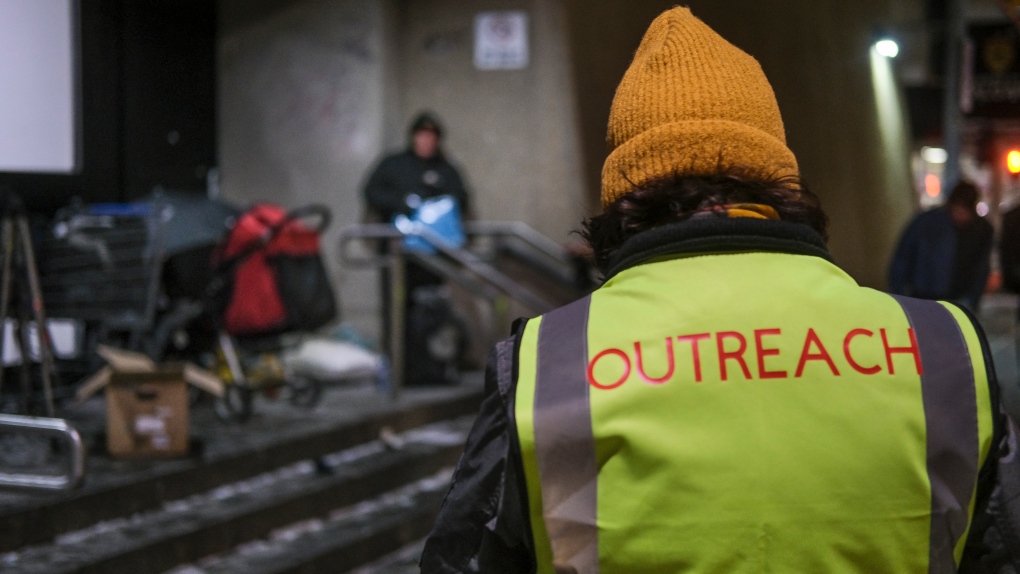City funding tackles challenges homeless face through extreme weather
 Outreach volunteers offer help to the homeless on a -20C night in Calgary, Alta., Tuesday, Dec. 14, 2021. THE CANADIAN PRESS/Jeff McIntosh
Outreach volunteers offer help to the homeless on a -20C night in Calgary, Alta., Tuesday, Dec. 14, 2021. THE CANADIAN PRESS/Jeff McIntosh
Organizations that assist the city's homeless population will be able to benefit from millions in funding to help protect Calgary's vulnerable populations from extreme weather events.
The Calgary Homeless Foundation (CHF) says the commitment from the City of Calgary will see $2.3 million over the next four years.
Officials say the money will be used to coordinate efforts with shelters, social agencies and outreach programs to help the homeless during severe weather.
"We are pleased that the city of Calgary has decided to continue supporting this critical initiative," said Patricia Jones, CHF CEO in a release.
"This new funding clearly indicates the city's commitment to work with community organizations like us to tackle the complex nature of homelessness."
Last year, the CHF was assisted by the city and the United Way to create warm spaces, provide winter essentials and support other efforts during extreme cold events.
That work continued as a need arose during the summer in Calgary.
The CHF's goal is to create "a year-round" plan to support Calgary's homeless during extreme weather conditions.
CTVNews.ca Top Stories

Air traveller complaints to Canadian Transportation Agency hit new high
The Canadian Transportation Agency has hit a record high of more than 71,000 complaints in a backlog. The quasi-judicial regulator and tribunal tasked with settling disputes between customers and the airlines says the backlog is growing because the number of incoming complaints keeps increasing.
Orca calf that was trapped in B.C. lagoon for weeks swims free
An orca whale calf that has been stranded in a B.C. lagoon for weeks after her pregnant mother died swam out on her own early Friday morning.
AFN chief says Air Canada offered a 15% discount after her headdress was mishandled
After the Assembly of First Nations' national chief complained to Air Canada about how staffers treated her and her ceremonial headdress on a flight this week, she says the airline responded by offering a 15 per cent discount on her next flight.
Sophie Gregoire Trudeau on navigating post-political life, co-parenting and freedom
Sophie Gregoire Trudeau says there is 'still so much love' between her and Prime Minister Justin Trudeau, as they navigate their post-separation relationship co-parenting their three children.
DEVELOPING Bird flu outbreaks: WHO weighs in on public health risk
The current overall public health risk posed by the H5N1 bird flu virus is low, the World Health Organization said on Friday, but urged countries to stay alert for cases of animal-to-human transmission.
76ers All-Star centre Joel Embiid says he has Bell's palsy
Philadelphia 76ers All-Star centre Joel Embiid has been diagnosed with Bell’s palsy, a form of facial paralysis he says has affected him since before the play-in tournament.
Island near Mull of Kintyre for sale for US$3.1 million
An idyllic 453-acre private island is up for sale off the west coast of Scotland and it comes with sandy beaches, puffins galore, seven houses, a pub, a helipad and a flock of black-faced sheep.
King Charles' cancer treatment progressing well, says Buckingham Palace
King Charles III’s doctors are 'sufficiently pleased' with his cancer treatment and he is expected to return to public-facing duties, Buckingham Palace announced on Friday.
Flight attendant indicted in attempt to record teen girl in airplane bathroom
An American Airlines flight attendant was indicted Thursday after authorities said he tried to secretly record video of a 14-year-old girl using an airplane bathroom last September.

































